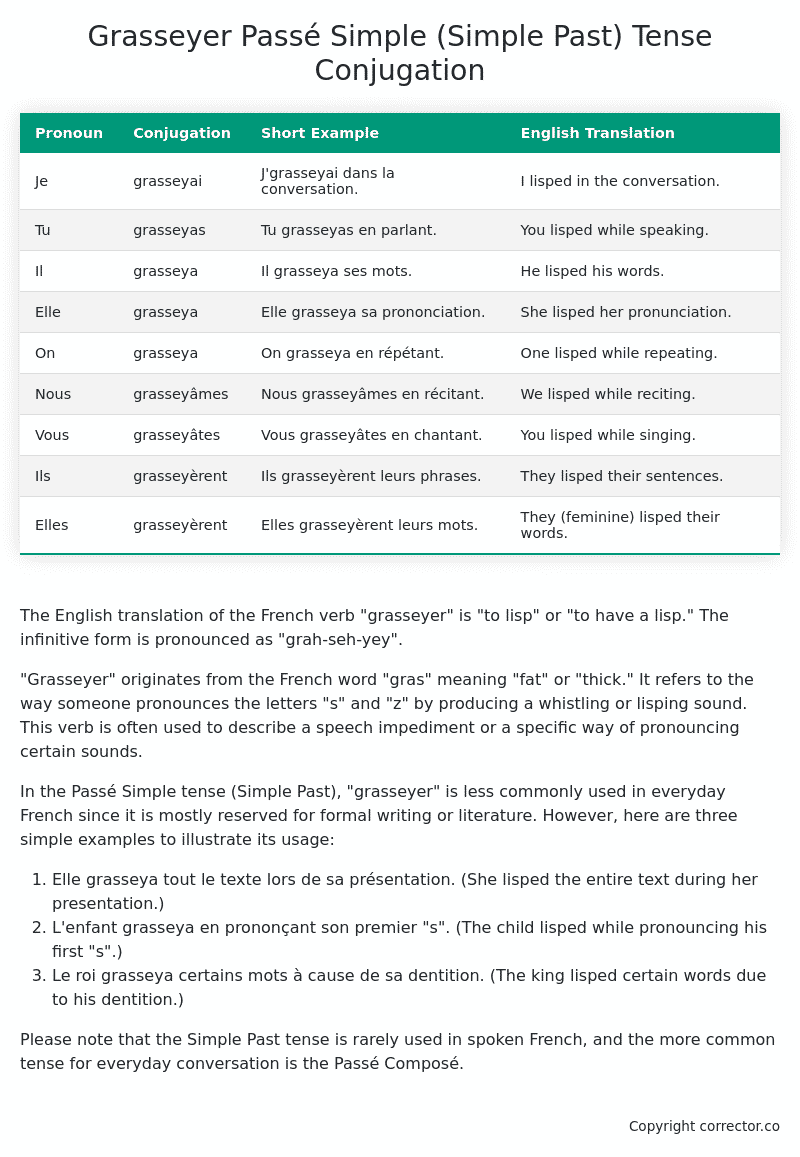Passé Simple (Simple Past) Tense Conjugation of the French Verb grasseyer
Introduction to the verb grasseyer
The English translation of the French verb “grasseyer” is “to lisp” or “to have a lisp.” The infinitive form is pronounced as “grah-seh-yey”.
“Grasseyer” originates from the French word “gras” meaning “fat” or “thick.” It refers to the way someone pronounces the letters “s” and “z” by producing a whistling or lisping sound. This verb is often used to describe a speech impediment or a specific way of pronouncing certain sounds.
In the Passé Simple tense (Simple Past), “grasseyer” is less commonly used in everyday French since it is mostly reserved for formal writing or literature. However, here are three simple examples to illustrate its usage:
- Elle grasseya tout le texte lors de sa présentation. (She lisped the entire text during her presentation.)
- L’enfant grasseya en prononçant son premier “s”. (The child lisped while pronouncing his first “s”.)
- Le roi grasseya certains mots à cause de sa dentition. (The king lisped certain words due to his dentition.)
Please note that the Simple Past tense is rarely used in spoken French, and the more common tense for everyday conversation is the Passé Composé.
Table of the Passé Simple (Simple Past) Tense Conjugation of grasseyer
| Pronoun | Conjugation | Short Example | English Translation |
|---|---|---|---|
| Je | grasseyai | J’grasseyai dans la conversation. | I lisped in the conversation. |
| Tu | grasseyas | Tu grasseyas en parlant. | You lisped while speaking. |
| Il | grasseya | Il grasseya ses mots. | He lisped his words. |
| Elle | grasseya | Elle grasseya sa prononciation. | She lisped her pronunciation. |
| On | grasseya | On grasseya en répétant. | One lisped while repeating. |
| Nous | grasseyâmes | Nous grasseyâmes en récitant. | We lisped while reciting. |
| Vous | grasseyâtes | Vous grasseyâtes en chantant. | You lisped while singing. |
| Ils | grasseyèrent | Ils grasseyèrent leurs phrases. | They lisped their sentences. |
| Elles | grasseyèrent | Elles grasseyèrent leurs mots. | They (feminine) lisped their words. |
Other Conjugations for Grasseyer.
Le Present (Present Tense) Conjugation of the French Verb grasseyer
Imparfait (Imperfect) Tense Conjugation of the French Verb grasseyer
Passé Simple (Simple Past) Tense Conjugation of the French Verb grasseyer (You’re reading it right now!)
Passé Composé (Present Perfect) Tense Conjugation of the French Verb grasseyer
Futur Simple (Simple Future) Tense Conjugation of the French Verb grasseyer
Futur Proche (Near Future) Tense Conjugation of the French Verb grasseyer
Plus-que-parfait (Pluperfect) Tense Conjugation of the French Verb grasseyer
Passé Antérieur (Past Anterior) Tense Conjugation of the French Verb grasseyer
Futur Antérieur (Future Anterior) Tense Conjugation of the French Verb grasseyer
Subjonctif Présent (Subjunctive Present) Tense Conjugation of the French Verb grasseyer
Subjonctif Passé (Subjunctive Past) Tense Conjugation of the French Verb grasseyer
Subjonctif Imparfait (Subjunctive Imperfect) Tense Conjugation of the French Verb grasseyer
Subjonctif Plus-que-parfait (Subjunctive Pluperfect) Tense Conjugation of the French Verb grasseyer
Conditionnel Présent (Conditional Present) Tense Conjugation of the French Verb grasseyer
Conditionnel Passé (Conditional Past) Tense Conjugation of the French Verb grasseyer
Conditionnel Passé II (Conditional Past II) Tense Conjugation of the French Verb grasseyer
L’impératif Présent (Imperative Present) Tense Conjugation of the French Verb grasseyer
L’impératif Passé (Imperative Past) Tense Conjugation of the French Verb grasseyer
L’infinitif Présent (Infinitive Present) Tense Conjugation of the French Verb grasseyer
L’infinitif Passé (Infinitive Past) Tense Conjugation of the French Verb grasseyer
Le Participe Présent (Present Participle) Tense Conjugation of the French Verb grasseyer
Le Participe Passé (Past Participle) Tense Conjugation of the French Verb grasseyer
Struggling with French verbs or the language in general? Why not use our free French Grammar Checker – no registration required!
Get a FREE Download Study Sheet of this Conjugation 🔥
Simply right click the image below, click “save image” and get your free reference for the grasseyer Passé Simple tense conjugation!

Grasseyer – About the French Passé Simple (Simple Past) Tense
Formation
Usage
Narration
Historical Context
Interactions with other tenses
Passé Composé
Imparfait
Conditional and Subjunctive
Summary
I hope you enjoyed this article on the verb grasseyer. Still in a learning mood? Check out another TOTALLY random French verb conjugation!


